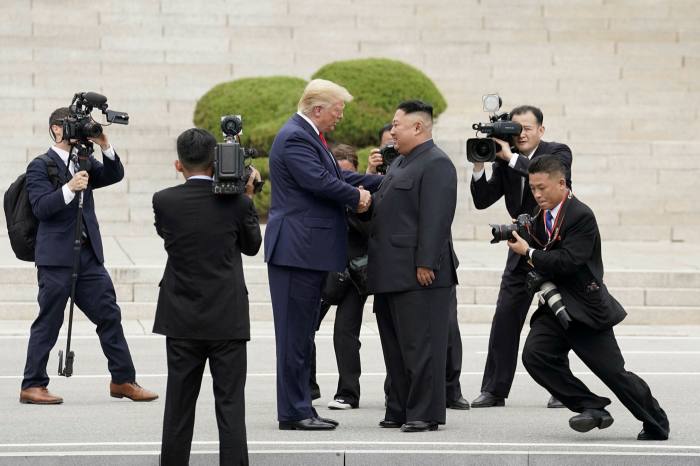[ad_1]
Before he won the US election, North Korea dismissed Joe Biden as a “fool of low IQ†while the presidential candidate labelled Kim Jong Un a “thugâ€.
But in the wake of the White House’s announcement that it had completed putting together its policy on North Korea, scepticism is rising over whether the president will step back from that antagonistic stance and engage with the nuclear-armed dictator.
Few details of the plan have been announced, but many foreign policy experts believe the US president has already downgraded Washington’s attention to North Korea — a priority for Donald Trump’s administration — as Biden seeks to tackle domestic problems and sharpen focus on China.
Sue Mi Terry, a former CIA analyst who briefed presidents George W Bush and Barack Obama on North Korea, believed Biden’s policy was being designed as a “holding action, not a breakthroughâ€.
“The administration is not hyping its proposal. It realises that it’s unlikely to ‘solve’ the North Korean problem; it likely seeks to keep North Korea quiet so it can concentrate on more pressing priorities elsewhere that are solvable,†she said.
Having now completed the months-long policy review, administration officials said Biden would “explore diplomacy†as part of a “calibrated, practical approachâ€. They have also been swift to play down expectations, noting the past four presidents failed to convince North Korea to abandon nuclear weapons.
“We have . . . a very clear policy that centres on diplomacy . . . it is up to North Korea to decide whether it wants to engage or not on that basis,†Antony Blinken, secretary of state, said on Monday.
The review followed a turbulent period in US-North Korea ties. After an escalation in animosity and weapons tests, Trump broke protocol and met the North Korean leader three times. While tensions eased, Trump failed to achieve a long-term agreement.
But Biden has been quick to distance himself from Trump and Obama, who he and much of his foreign policy team served for eight years.
“Our policy will not focus on achieving a grand bargain, nor will it rely on ‘strategic patience’,†said Jen Psaki, White House press secretary, referring to Trump’s theatrical summitry and Obama’s years of inaction on North Korea.
Pyongyang on Sunday blasted Biden’s “intent to keep enforcing . . . hostile policy†and warned that “with time, the US will find itself in a very grave situationâ€.
Soo Kim, a former CIA North Korea analyst now at the think-tank Rand Corporation, expected the Kim regime to resume military provocations. “There is little holding Pyongyang back from brinkmanship,†she said.

Last month, the US intelligence community’s annual threat assessment warned that North Korea would pose “an increasing threat†to America. It said Kim believed he would gain international acceptance as a nuclear power over time and “probably does not view the current level of pressure on his regime as enough to require a fundamental change in its approachâ€.
Terry, who is at the Center for Strategic and International Studies, said offering North Korea a “phased agreementâ€, which would essentially propose some sanctions relief in return for limited nuclear concessions, “makes logical senseâ€.
“But in practice, this is unlikely to work,†she said. “If Kim sticks to his resolve, talks won’t go anywhere and I doubt that the Biden team would be very surprised by that.â€
Further complicating the situation, Washington is also trying to manage the expectations of Seoul, which favours easing sanctions and greater economic engagement with Pyongyang, and Tokyo, which holds a much harder line.
Jake Sullivan, Biden’s national security adviser, told the Financial Times that diplomacy with North Korea would be “partly bilateral and partly multilateralâ€.
That formulation pointed to another priority for the Biden administration: to avoid widening differences between Japan and South Korea at a time when the US is trying to work with allies to respond to China’s rise.
Biden’s caution on North Korea also reflected stark divisions among Washington experts over the extent to which engagement with North Korea could be successful.
“If I’m correct in my belief that North Korea will not denuclearise, the objective of the [Biden administration’s] policy should be to lower the danger of these nuclear weapons,†said William Perry, former US secretary of defence.
Despite Pyongyang’s bluster, others believe Kim has not completely rejected diplomacy, as he seeks relief from damaging economic sanctions.
Ramon Pacheco Pardo, a North Korea expert at King’s College London, noted several “positive signalsâ€, including Kim’s adherence to a de facto moratorium on nuclear and intercontinental ballistic missile tests since his summit with Trump in Singapore in 2018.
Preparatory work was also under way for potential “track two†talks: back-channel discussions involving North Korean diplomats and foreign non-government experts, people familiar with the discussions said.
“They have certainly left the door open,†said Glyn Ford, a former member of the European parliament with close connections to high-ranking North Korean officials. “Quite how far open the door is, I’m unclear.â€
[ad_2]
Source link





